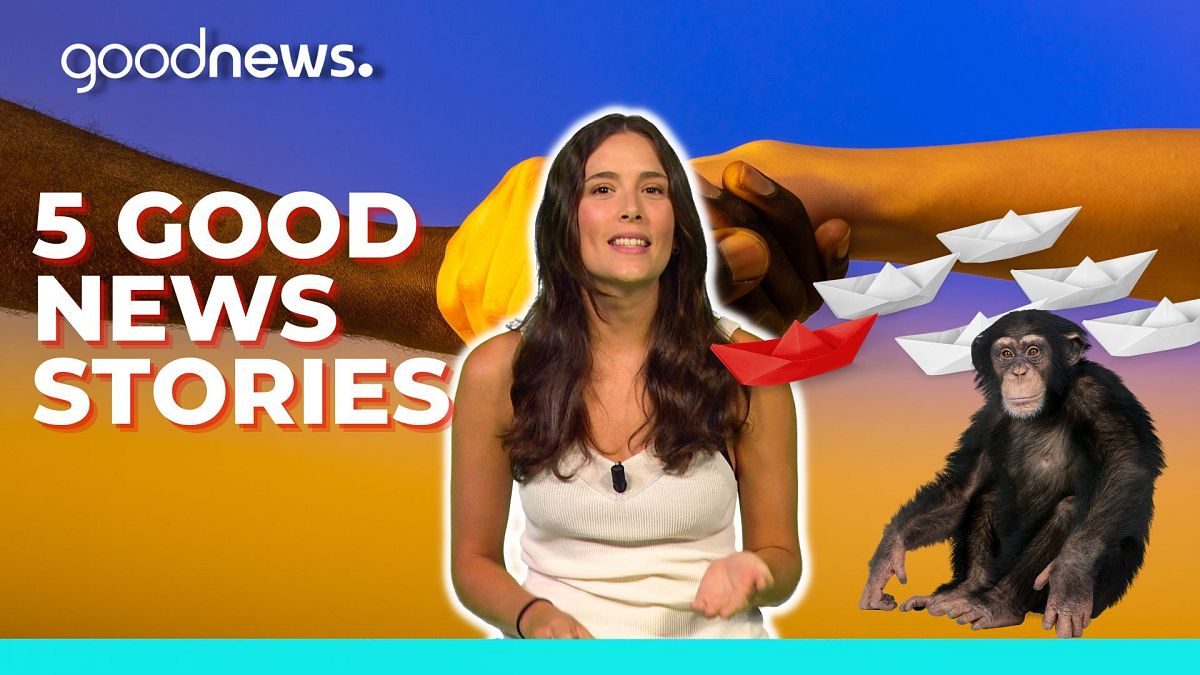Headlines can be hard going but not all news is bad news, here are five positive stories from this week. #goodnews
This is the Good News round-up, a weekly video digest to bring you stories of hope.
The list is not biased or political. It is just plain good news for everyone, picked by our team to make you feel better about the state of the world.
- A ship carrying around 23,000 tonnes of grain from Ukraine was finally allowed to dock in East Africa.
- There is good news about the monkeypox outbreak.
- Engineers have found a way to recycle resin from wind turbine blades into gummy bears and nappies.
- The first Greek island with zero stray dogs.
- An enzyme that can eat up plastic.
Watch the video above to get this week’s hit of positivity, in full.
1. A life-saving shipment of Ukrainian grain has arrived in East Africa, the first of its kind since the war began.
Ukraine, along with Russia, is one of the biggest exporters of grain, including cereal crops such as wheat, maize (corn) and barley.
Ukraine in particular has historically been one of the world’s largest contributors to the World Food Programme.
Watch the video above for more facts, including a new deal that will open up the way for more ships to transport grain, and hear from the directors of the UN World Food Programme on how the ship will feed around 1.5 million people.
2. After the two long years of COVID-19, the rise of monkeypox was a particularly worrying development. But there is good news on the horizon.
The World Health Organization’s regional director for Europe has said that the virus might be on the way out.
Watch the Good News round-up above to find out more.
3. Engineers are turning old wind turbine blades into gummy bears and nappies
Engineers at the University of Michigan have invented a new type of resin using two polymers that, unlike traditional resin, can be reused in the production of worktops, tail lights, power tools, nappies, cars, new turbine blades and even gummy bears.
Watch the video above to find out more and click here to read Angela Symons’ article for Euronews on why this is a great leap forward.
4. A couple is fighting to bring the number of stray dogs down to zero in Greece, and getting very close.
Inspired by the dog they adopted on the island of Mykonos, a New York couple, Theo Moumtzidis and Silja Schiller-Moumtzidis, is working with the authorities in Greece to tackle the huge problem of stray dogs, starting with the island of Aegina.
Just four years into the ambitious plan, the Zero Stray Pawject has brought the number of strays down from 300 to 30, according to Schiller-Moumtzidis.
The couple's strategy focuses on prevention: attacking the root problems of abandonment, irresponsible ownership, and the anonymity of dogs.
Find out more about the project, including the Zero Stray Pawject’s brand new academy, and meet the doggie that inspired it all in the video above.
5. An enzyme that can eat up plastic in a matter of hours or days is now a reality, thanks to scientists at the University of Texas in Austin.
Watch the Good News round-up to get all the details, including a video of the enzymes eating a plastic container over 48 hours.
Remember that it can be hard to find among the headlines, but some news can be good news.
